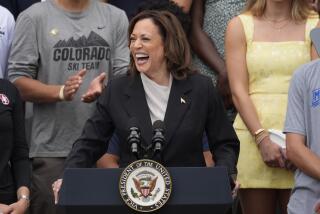Crying Wolf With the Race Card : African Americans should not allow their leaders to duck real political issues with false charges of racism.
- Share via
It’s time for a reality check.
It’s time for African Americans to put down our score cards, stop pointing fingers and start to conduct a sobering analysis of the racial tactics some African American leaders use to protect themselves and their powerful positions. Unfortunately, these are actions that define them as neither intellectually courageous nor politically astute.
I’m talking about playing the race card.
Whenever an African American leader is accused of illegal or inappropriate behavior by “the system,” the race card is the smoke screen of choice. It is almost an involuntary reaction to any politically unpleasant situation, and a definite attempt to tap into blacks’ extreme cynicism about the American way of life. Such a senseless and baseless defense nullifies the impact of legitimate racial issues that need to be pursued with vigor and tenacity. It’s tantamount to crying wolf when no wolf is at the door.
In response to a race-card defense, we react just as we’ve been programmed to do. Instead of excoriating black leaders for falling in love with their power, image and shameless sense of invincibility, African Americans buy into the specially orchestrated drama that is calculated to stir up hatred, division and fear. We rarely pause in our thirst for justice to give ourselves time to engage in a careful reflection of the issues. Yes, America is a land where racism is alive and well, but could it be that we’re defending a devil as a reflex action?
The time has come to admit that African American leaders must be put to the same credibility test that we say we want all leaders measured by. Disagreeing with, condemning or not supporting an African American leader is not an indictment of our “blackness” or sense of community. We should be relentless in our drive to protect black leaders if they are right; we should be unstoppable if they have a valuable message to disseminate.
We must not, however, be pawns in the race-card game when our leaders have betrayed our trust, when money and power--not “the system”--is their shortcoming. Instead of being so accommodating, we need to admit when we have been emotionally raped by those who misused our trust. If they allowed ego and greed to amputate their social, economic and political lifelines, they alone should pay the price.
Some African Americans cried foul when it was publicly revealed that Marion Barry, the former mayor of Washington, had a penchant for illegal drugs and illicit sex. They ignored the fact that Barry had betrayed a covenant made with his constituents. Instead, they chose to focus on “the system”--as if racism is a rational explanation for coke-snorting and other illegalities.
When Clarence Thomas was accused by Anita Hill of sexual harassment, he immediately played the race card. Though he had been adopted by the “good old boys,” he made his Caucasian buddies squirm by dubbing them eager participants in a “high-tech lynching.” The race card, with all its shock value, won him a seat on the Supreme Court.
Now, we have Rep. Walter R. Tucker III (D-Compton), who was indicted for allegedly soliciting bribes and then failing to pay taxes on them. He quickly played the race card and engaged in venomous rhetoric against “the system.” When Rep. Mel Reynolds (D-Ill.) was indicted for statutory rape and other charges involving an alleged affair with a 16-year-old campaign worker, he too played the race card. And Benjamin Chavis, fired recently as executive director of the NAACP, immediately charged that there was a right-wing-Jewish conspiracy against him--as if this, and not alleged incompetence and clashing ideologies, were his downfall.
If our leaders create their own nightmares, then they belittle our character by implicating us in a race issue that does not exist. If we support them simply because we are angry with “the system,” then we are mindless fools, not free-thinking citizens.
African American leaders must be fearless, not senseless. And while it is true that African Americans have been at the bottom of the barrel of opportunity for too long, we’ll arrive where we need to be because of an economic base, political clout, wide support--and because we have the good sense to weed out the ineffective among us and nurture both the talented and the gifted. But we must cry wolf only when the wolf is at the door.
More to Read
Sign up for Essential California
The most important California stories and recommendations in your inbox every morning.
You may occasionally receive promotional content from the Los Angeles Times.













